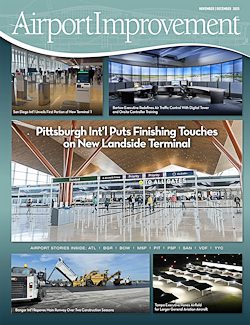Amid all the turmoil that COVID-19 has wrought, the only public airport on the small island of Nantucket, MA, is taking on a big issue: potential environmental contamination associated with common components in FAA-mandated firefighting foam.
Amid all the turmoil that COVID-19 has wrought, the only public airport on the small island of Nantucket, MA, is taking on a big issue: potential environmental contamination associated with common components in FAA-mandated firefighting foam.
The compounds at issue are per- or poly-fluoroalkyl substances (PFAS). And even as air travel around the globe ground to a snail’s pace, Nantucket Memorial Airport (ACK) tackled the thorny environmental issues surrounding them head on.
So far, ACK has spent an estimated $2 million on various remediation measures and plans to invest another $6 million in longer-term measures over the next six years. That’s a sizable undertaking for a municipally owned facility that logged about 70,000 operations and 128,000 enplanements in its 2018/19 fiscal year. Given the pervasive nature of firefighting foam containing PFAS, airports of all sizes throughout the world will likely face PFAS-related projects and expenses of their own.
|
facts&figures Project: Managing Environmental Impacts of Firefighting Foam Location: Nantucket (MA) Memorial Airport Volume: Nearly 128,000 enplanements & almost 70,000 operations in fiscal year 2018/19; 2nd busiest airport in Massachusetts Compounds of Concern: Per- or poly-fluoroalkyl substances (PFAS), a component of FAA-mandated aqueous film-forming foam (AFFF) Costs to Date: $2 million to provide point-of-entry treatment systems, soil testing & bottled water for nearby residents In-Process Costs: $6 million for soil remediation & water main extension project Proactive Steps Taken: Discontinued using AFFF for onsite training; purchased new equipment to test & calibrate foam dispensing equipment with no AFFF discharge; developed & implemented strategic testing plan for soil & water; sampled airport sites in question & water/wells of residential neighbors; supplied bottled water, installed point-of-entry treatment systems & tested water for nearby residents; initiated projects to extend water main & remediate affected soil; established website to maintain open communication with public, stakeholders, regulators & aviation industry Consultant: McFarland-Johnson Inc. Licensed Environmental Site Professional: Weston Solutions Test Equipment for Foam-Dispensing Vehicles: ECOLOGIC, from E-ONE Website Outlining Airport Efforts: www.ack-pfas.com |
Continuing its history of environmental action, Massachusetts enacted one of the most stringent PFAS regulations in the United States last year while the coronavirus pandemic raged. New state regulations for drinking water set the combined limit for six specific PFAS chemicals at 20 parts per trillion, compared to the federal health advisory level of 70 parts per trillion.
Massachusetts legislators cited serious health impacts associated with PFAS exposure as the primary reason for setting more cautious limits. Scientific studies link exposure to reduced fertility and low birth rates, liver and kidney damage, thyroid disease, elevated cholesterol and other troubling health issues. Research also suggests PFAS exposures can suppress the immune systems of children.
Pandemic or not, airport officials in Nantucket felt they needed to address the issue immediately. “A lot of credit goes to our airport commission for realizing very quickly that we needed a long-term solution,” says ACK Assistant Manager Noah Karberg.
Because Nantucket is an island accessible only by air service, boat or ferry, the possibility of soil contamination—from firefighting foam or any other source—is a critical concern for the 10,000 residents who rely on private or local wells as their primary source of water.
“This is a small island, and the affected homeowners are our neighbors and our friends,” says Karberg. “Mitigating PFAS is very personal to us.”
The airport acted quickly by initiating soil and well testing, and provided bottled water to residents while waiting for results. Later, water filtration systems were installed at affected homes and specialists were hired to work on longer-term solutions. ACK also invested in new equipment. The ECOLOGIC cart from E-ONE allows its emergency response crews to test firefighting foam without environmental impacts.
Currently, the airport is extending a water main to bring clean municipal water to homes with PFAS-contaminated wells.
A Widespread Concern
PFAS contamination is potentially an issue at every commercial service airport, because emergency response teams use aqueous film-forming foam (AFFF), an FAA-mandated firefighting material that contains PFAS.
The FAA requires Part 139-certified airports to have AFFF on hand and on fire apparatus, ready to discharge in an emergency. The industry recognizes PFAS-based AFFF products for their superior performance in extinguishing petroleum fires.
There are three broad categories for AFFF use: during emergencies to suppress and extinguish fires, for equipment calibration to ensure trucks discharge foam in the correct concentration, and during live fire training exercises. Though many states now ban AFFF discharge for training, airport response teams still use it to fight fires and for testing equipment. ACK eliminated the need to discharge AFFF during testing with its ECOLOGIC cart.
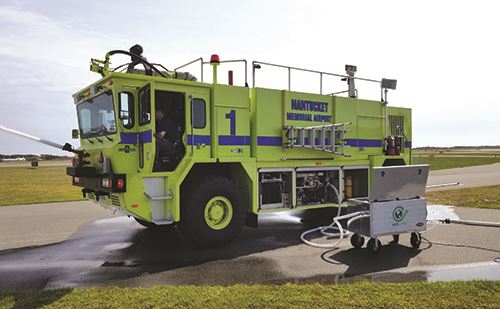
When dispersed for any reason, PFAS can penetrate the ground, reach water wells, and be carried into nearby creeks and streams by rain. In 2019, the Environmental Working Group found more than 1,500 drinking-water systems across the U.S. that were contaminated with PFAS, affecting over 110 million Americans. On the flip side, some industry consultants feel that the public is “clamoring for remediation solutions well ahead of the science.” This leaves some airports in a confusing, uncomfortable position.
Driven by stricter state regulations and a strong sense of local accountability, ACK hired Weston Solutions, a licensed environmental and infrastructure support consultant based in West Chester, PA, for site management. After they were knee-deep in the project, airport officials felt that the complicated PFAS issue required more support than Weston Solutions could provide alone. So ACK hired McFarland-Johnson to oversee and manage the overall sampling and mitigation program, freeing Weston Solutions to focus on the science, data collection and sampling.
“The airport realized this complex process requires a consulting firm that understands airports to manage remediation,” says Rich Lasdin, senior project manager for McFarland-Johnson. “We are helping them manage how the process will impact the airport, airport operations, active construction projects, airspace and other items that go along with working at an airport.”
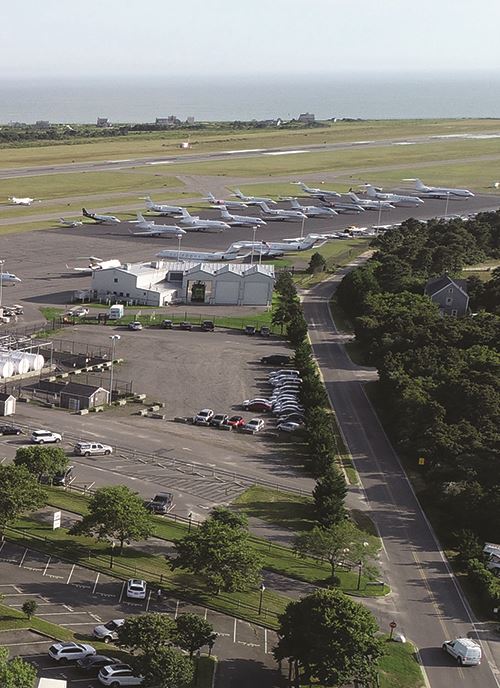
Knocking on Doors & Hiring Plumbers
With a bigger team in place, the focus turned to water testing. To date, Weston Solutions has collected more than 300 water samples from local water wells and monitoring wells.
Test results indicated that some wells south of the airport had PFAS levels well over allowable concentrations set by the Massachusetts Department of Environmental Protection. Weston Solutions then sampled sites west of the airport and found less PFAS contamination. “But we found some,” notes Karberg. “And we’ve been responding to affected households with bottled water and water service provisions.”
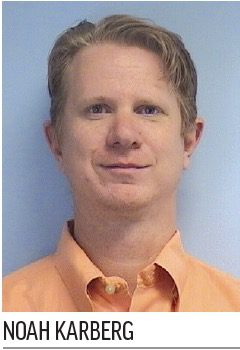 Testing took longer than normal due to the pandemic. Collecting water samples proved difficult, because many houses in Nantucket are vacation homes, and the owners were not traveling to the island per the advice of health officials. Other homeowners were reluctant to let workers in to collect samples. “Sometimes, it took eight months to get permission to access a home, just to get a sample,” explains Karberg. “Eventually, we sampled 100% of the homes adjacent to the airport.”
Testing took longer than normal due to the pandemic. Collecting water samples proved difficult, because many houses in Nantucket are vacation homes, and the owners were not traveling to the island per the advice of health officials. Other homeowners were reluctant to let workers in to collect samples. “Sometimes, it took eight months to get permission to access a home, just to get a sample,” explains Karberg. “Eventually, we sampled 100% of the homes adjacent to the airport.”
Results ranged from no detectable PFAS to more than 1,000 parts per trillion. The airport took immediate action by providing bottled water to 65 homeowners whose drinking water tested at over 20 parts per trillion.
It also hired plumbers to install point-of-entry treatment (POET) systems at 19 affected homes. “POET systems are pre-filter systems that attach to the water service at the entrance to a home,” Karberg explains. “The filter exchange medium treats the house’s entire water system.”
 Georgie Nugent, regional director of environmental services for McFarland-Johnson, notes that adding POET systems and supplying Nantucket residents with bottled water were not simple tasks. “We helped the airport abide by state procurement laws and secured the right products and systems as expediently as possible,” says Nugent. “It’s been a logistical challenge getting things done because the island lies 30 miles off the coast.”
Georgie Nugent, regional director of environmental services for McFarland-Johnson, notes that adding POET systems and supplying Nantucket residents with bottled water were not simple tasks. “We helped the airport abide by state procurement laws and secured the right products and systems as expediently as possible,” says Nugent. “It’s been a logistical challenge getting things done because the island lies 30 miles off the coast.”
McFarland-Johnson coordinated with the Massachusetts Attorney General’s office, partnered with legal counsel, and even picked up the phone to order systems and line up plumbers. The company also posted a full-time employee at ACK to assist on site.
Although airport leaders are relieved to have bottled water and POET systems in place, they consider both to be temporary fixes. Longer-term plans include bringing treated municipal water to affected homes by extending an existing water main and remediating the impacted soil and groundwater.
“We hope to start construction soon,” Karberg said in April, noting that the project is above and beyond the usual response.
“Most airports provide bottled water and some initiate POET installations, but I know of very few that have started water main construction,” he remarks. “The water main will cost us $3 to $4 million. But in the long run, it will be more cost-effective. It’s also easier than winterizing and maintaining POET systems and conducting repeat testing.”
Granular Public Education
Karberg and his staff are feeling the full weight of the PFAS issue. “This is a complicated situation, and initially residents were very scared,” he relates. “They saw the contamination as a violation of trust. They feared the contaminated drinking water would impair their health. It’s something they never worried about before.”
The airport responded with transparency, hosting a series of public meetings to educate and inform. It also launched a website (www.ack-pfas.com), designed by McFarland Johnson, to keep communication channels open.
“Going out to educate and inform, and show our progress, has gone a long way in easing public fears,” Karberg reports. “It shows our commitment to doing the right thing.”
 Speaking from a consultant’s perspective, Lasdin explains that calming fears requires transparency. “The website lets the airport get the message out and own the message to be proactive versus reactive,” he says.
Speaking from a consultant’s perspective, Lasdin explains that calming fears requires transparency. “The website lets the airport get the message out and own the message to be proactive versus reactive,” he says.
Once again, the pandemic presented additional challenges. When Nantucket limited access to the island, ACK responded by hosting virtual public meetings. “We made sure that every person on a Zoom meeting could comment and ask questions to abide by Massachusetts public meeting laws,” Lasdin notes. “We then met with people individually to answer questions specific to their situations.”
The public education process began by inviting all residents to open informational meetings. Then, the project team moved to smaller virtual gatherings, with a maximum of five or six homeowners. Eventually, airport officials made in-person visits to meet with individual homeowners.
McFarland Johnson helped the airport with messaging and planning on a detailed level. “We need to work with homeowners if the water main will run through their front lawn, or we have to tear up plantings, or patch their driveways,” Lasdin explains. “We are calling them and saying, ‘Let’s talk about what this project means to you.’”
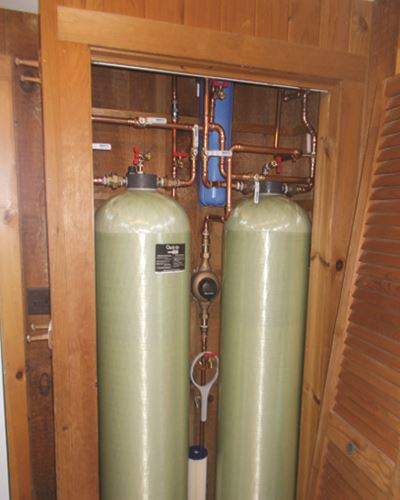
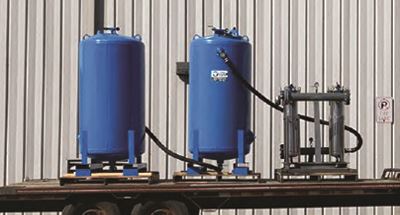
Water Main Project Moves Forward
The airport is extending a municipal water main two miles from the nearest connection point to affected residents. The work is scheduled to begin in July and take four months to complete.
Designing the water main required ACK to meet strict environmental laws, this time involving the protection of threatened and endangered species. Early in design, McFarland Johnson had to move the initial path of the proposed water main extension because it impacted Sandplain Blue-eyed Grass, a threatened and endangered species. Then, PFAS was detected in soil samples collected in the vicinity of the new proposed path, and engineers had to move the path again. The current plan takes the water main under the approach of the airport’s primary runway safety area.
“We had a lot of discussions about the type of construction we could use,” Lasdin relates. “Eventually, we agreed to directional drill across the protected areas of the runway to avoid closure as we constructed the water main.” Direct drilling allows crews to tunnel beneath the surface to install the water main without disruption.
With that decision made, the airport had to contact homeowners and rental management firms to discuss the impending project. “Phasing is a big challenge,” emphasizes Lasdin. “There is no other way to run this water main. It has to run along a one-lane dirt road to residences, and the road has protected habitat on both sides. We have developed a solution that meets these needs.”
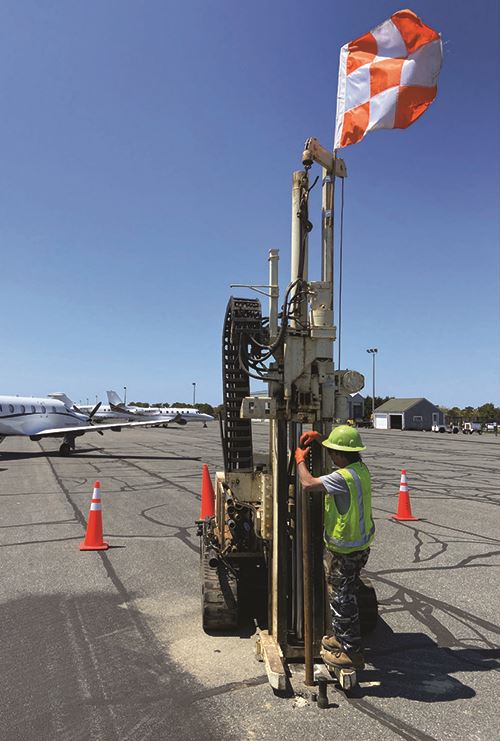
Dirty Dirt
Beyond the wildlife and water issues, airport officials will eventually have to deal with PFAS-contaminated soil. And exporting it to a landfill that accepts contaminated material isn’t a likely option.
“Right now, we don’t know the volume of soil we are dealing with, but we’d be talking about potentially hundreds of millions of dollars to move contaminated soil off the island by ferry,” Karberg explains. “I don’t know what the solution will be right now, but I know it won’t involve trucking soil off the island. We will need to do an onsite engineering treatment.”
After further soil testing assesses the extent of contamination, ACK will move forward dealing with the site. “Other airports are using various types of remediation, including cap in place,” notes Lasdin. “We are working with the state to determine how we will handle contaminated soil.”
While some questions still remain, one thing is a given—ACK will continue to go above and beyond to protect its fellow residents.
“Nantucket Memorial Airport, like all airports in Massachusetts, is getting held to some pretty large financial expenditures to clean up the situation,” says Lasdin. “But they are doing the right thing. They are cleaning it up and standing behind their responsibilities.”
For more information about how other airports are dealing with the PFAS issue, check out the July/August 2019 and October 2019 issues of Airport Improvement magazine.


